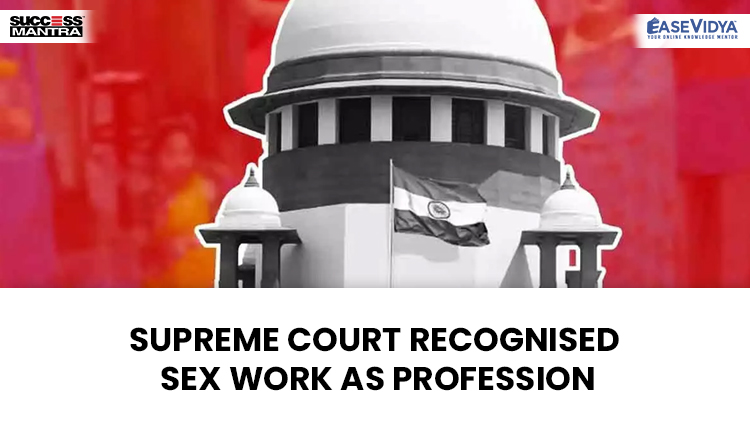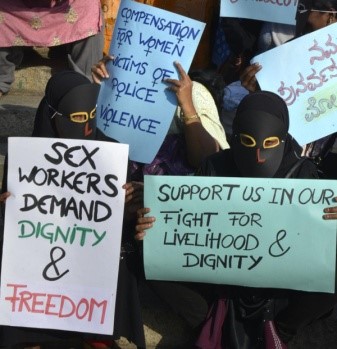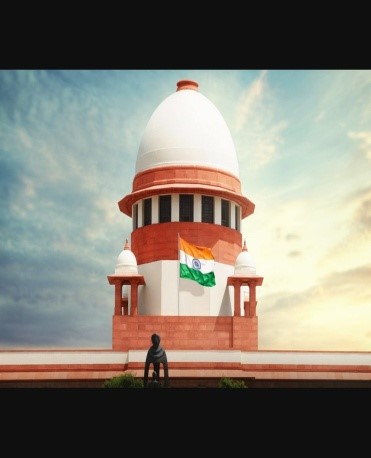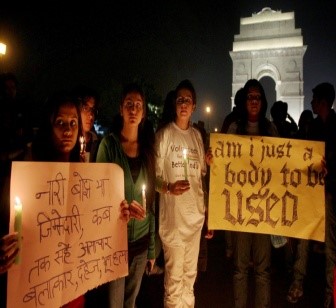
SUPREME COURT RECOGNISED SEX WORK AS PROFESSION
SUPREME COURT RECOGNISED SEX WORK AS PROFESSION
"Notwithstanding the profession, every individual in this country has a right to a dignified life under Article 21.” With these words, the Supreme Court on Thursday recognised prostitution as a profession and said and sex workers are entitled to dignity and equal protection under the law. The three-bench judge comprising Justices L Nageswara Rao, BR Gavai and AS Bopanna gave six directions for safeguarding sex workers’ rights, stating, “Sex workers are entitled to equal protection of the law. When it is clear that the sex worker is an adult and is participating with consent, the police must refrain from interfering or taking any criminal action. It need not be again said that notwithstanding the profession, every individual in this country has the right to a dignified life under Article 21 of the Constitution.” The court invoked its special powers under Article 142 of the Constitution. Article 142 provides discretionary power to the Supreme Court as it states that the Supreme Court in the exercise of its jurisdiction may pass such decree or make such order as is necessary for doing complete justice in any cause or matter pending before it. In 2020, the National Human Rights Commission (NHRC) recognised sex workers as informal workers.

Current Affairs Notes By Success Mantra Coaching Institute GTB Nagar Delhi CLICK HERE
WHAT ARE THE HIGHLIGHTS OF THE SC JUDGMENT?
- Criminal Law: Sex workers are entitled to equal protection of the law and criminal law must apply equally in all cases, on the basis of ‘age’ and ‘consent’. When it is clear that the sex worker is an adult and is participating with consent, the police must refrain from interfering or taking any criminal action. Article 21 declares that no person shall be deprived of his life or personal liberty except according to procedure established by law. This right is available to both citizens and non-citizens. Sex workers should not be “arrested or penalised or harassed or victimised” whenever there is a raid on any brothel, “since voluntary sex work is not illegal and only running the brothel is unlawful”.
- Right of Child of a Sex Worker: A child of a sex worker should not be separated from the mother merely on the ground that she is in the sex trade. Basic protection of human decency and dignity extends to sex workers and their children. Further, if a minor is found living in a brothel or with sex workers, it should not be presumed that the child was trafficked. In case the sex worker claims that he/she is her son/daughter, tests can be done to determine if the claim is correct and if so, the minor should not be forcibly separated.
- Medical Care: Sex workers who are victims of sexual assault should be provided every facility including immediate medico-legal care.
- Role of Media: Media should take “utmost care not to reveal the identities of sex workers, during arrest, raid and rescue operations, whether as victims or accused and not to publish or telecast any photos that would result in disclosure of such identities.
RELATED PROVISIONS/SC VIEWS IN INDIA?
- Immoral Traffic (Prevention) Act: The legislation governing sex work in India is the Immoral Traffic (Prevention) Act. The Suppression of Immoral Traffic in Women and Children Act was enacted in 1956. Subsequent amendments were made to the law and the name of the Act was changed to Immoral Traffic (Prevention) Act. The legislation penalises acts such as keeping a brothel, soliciting in a public place, living off the earnings of sex work and living with or habitually being in the company of a sex worker.
- Justice Verma Commission (2012-13): The Justice Verma Commission had also acknowledged that there is a distinction between women who are trafficked for commercial sexual exploitation and adult, consenting women who are in sex work of their own volition.
- Budhadev Karmaskar Vs State of West Bengal (2011) Case: The Supreme Court, in Budhadev Karmaskar v. State of West Bengal (2011), opined that sex workers have a right to dignity.

LAWS AROUND PROSTITUTIONS IN INDIA
While the profession has long been prevalent in India, its legal status has always been under a cloud and many have over the years demanded that it be legalised. Currently, as per the Indian Penal Code (IPC), prostitution is not in a broad sense illegal, but several activities under prostitution are punishable by law. As per the Immoral Traffic (Prevention) Act, 1986, sex workers can practice their profession but activities; including pimping and running a brothel are considered a punishable offence. The law also states any person who makes an earning from prostitution is punished. Additionally, it is illegal to procure, induce, or abduct a person for prostitution. The law further mentions that the practice cannot take place within a 200-metre radius of any public place. To participate in prostitution lawfully, sex-worker must choose an isolated location. This clearly puts the legality of profession of prostitution in ambiguity.

COUNTRIES THAT LEGALISED PROSTITUTIONS
While the legality of sex work is vague in India, until now, other countries across the world have legalised the profession, granting sex workers equal rights and protection. Across Europe, countries such as Germany, Netherlands, France, Greece have legalised the profession. In Germany, the profession was legalised in 1927 and there are proper state-run brothels. The workers are provided with health insurance, have to pay taxes and they even receive social benefits like pension.
Netherlands began regulating prostitution in 2000. However, the sex trade was more or less tolerated for decades before. Prostitution has been legal in Switzerland since 1942 and is protected by the Constitution. Typically, sex workers work in a brothel or buy a daily "ticket" to sell sex in designated street areas. In France, prostitution is legal, but soliciting in public is still outlawed. Pimping is illegal and brothels were outlawed in 1946, right after the War. Austria is another country which has made prostitution completely legal. Prostitutes are required to register, undergo periodic health examinations, be 19 years of age or older, and pay taxes. Outside of Europe, there are other countries too that have legalised prostitution. In New Zealand, the profession has been legal since 2003 and the country also has licensed brothels operating under public health and employment laws. Canada has no law against the exchange of sex for money; it’s pimping or owning a brothel that is the problem. In Brazil, sex work is legal, though pimping is punishable by law. Similarly, It is legal to work in the sex industry in Colombia, though pimping isn’t. The country of Ecuador has legalised everything related to sex work — one can sell their body, run a brothel with no fear of the law.
PRAVAHINI Current Affairs Notes By Success Mantra Coaching Institute GTB Nagar Delhi CLICK HERE
TEST YOURSELF
Q.1 Recently, Supreme Court have given the landmark judgement regarding the recognition of Sex Work as profession. The decision was given by _________?
- Three-Judges Bench: ANSWER
- Five-Judges Bench
- Nine-Judges Bench
- None of the above-mentioned
Q.2 Under which of the following articles of the Indian Constitution, Every individual in this country has a right to a dignified life?
- Article 14
- Article 32
- Article 21: ANSWER
- All of the above-mentioned
Q.3 The legislation governing sex work in India, Immoral Traffic (Prevention) Act was enacted in which of the following years?
- 1987
- 1973
- 1956: ANSWER
- None of the above-mentioned
Q.4 From the given options, which of the following nations have not recognized the sex work as profession?
- France
- Germany
- Netherlands
- None of the above-mentioned: ANSWER
Q.5 Article 142 provides discretionary power to the ________ as it states that the _________ in the exercise of its jurisdiction may pass such decree or make such order as is necessary for doing complete justice in any cause or matter pending before it.
- Supreme Court: ANSWER
- High Courts
- Both Supreme Court & High Court
- None of the above-mentioned













tqvtyljkj
SUPREME COURT RECOGNISED SEX WORK AS PROFESSION | Read Daily Article Editorials Only On Success Mantra Blog | Daily Article | Monthly Article | Weekly Article | Yearly Article | Most Requesting Articles | Legal Awareness Articles | Current Affairs | Passage Based Current Affairs | One Linear Current Affairs | Current Affairs For CLAT | Current Affairs For AILET | Current Affairs For Slat | Legal Aptitude Current Affairs | Law Current Affairs | Current Event | Current Affairs Pdf | Current Affairs Pdf In English | Current Affairs Pdf Free Download | Current Affairs MCQ | Current Affairs MCQS | Current Affairs Work Sheet | Current Affairs UPSC | Current Affairs BBA | Current Affairs BCA | Current Affairs BJMC | Current Affairs NCHMJEE | Daily Editorial | Monthly Editorial | Weekly Editorial | Yearly Editorial | Most Asking Editorials | Legal Awareness Editorials | Current Editorial | Passage Based Current Editorial | One Linear Current Editorial | Current Editorial For CLAT | Current Editorial For AILET | Current Editorial For Slat | Legal Aptitude Current Editorial | Law Current Editorial | Current Event | Current Editorial Pdf | Current Editorial Pdf In ENGLISH | Current Editorial Pdf Free Download | Current Editorial MCQ | Current Editorial MCQS | Current Editorial Work Sheet | Current Editorial UPSC | Current Editorial BBA | Current Editorial BCA | Current Editorial BJMC | Current Editorial NCHMJEE | Latest News In India | Latest News In Hindi | Latest News Delhi | Latest News Today India | Latest News Live | 3 Latest News | Latest News Today Delhi | Latest News Aajtak | News Articles India | News Articles For Students | News Articles 2022 | News Articles In English | News Articles In Hindi | News Article Example | Short News Articles | News Article Meaning | Success Mantra Delhi | CLAT Coaching In Delhi | Best CLAT Du LLB Institute In Delhi | Read Daily Article Editorials Only On Success Mantra Blog [url=http://www.g1910sydd16g7wmnmpus5u14100x35d3s.org/]utqvtyljkj[/url] <a href="http://www.g1910sydd16g7wmnmpus5u14100x35d3s.org/">atqvtyljkj</a> tqvtyljkj http://www.g1910sydd16g7wmnmpus5u14100x35d3s.org/
yfbvdlnpe
SUPREME COURT RECOGNISED SEX WORK AS PROFESSION | Read Daily Article Editorials Only On Success Mantra Blog | Daily Article | Monthly Article | Weekly Article | Yearly Article | Most Requesting Articles | Legal Awareness Articles | Current Affairs | Passage Based Current Affairs | One Linear Current Affairs | Current Affairs For CLAT | Current Affairs For AILET | Current Affairs For Slat | Legal Aptitude Current Affairs | Law Current Affairs | Current Event | Current Affairs Pdf | Current Affairs Pdf In English | Current Affairs Pdf Free Download | Current Affairs MCQ | Current Affairs MCQS | Current Affairs Work Sheet | Current Affairs UPSC | Current Affairs BBA | Current Affairs BCA | Current Affairs BJMC | Current Affairs NCHMJEE | Daily Editorial | Monthly Editorial | Weekly Editorial | Yearly Editorial | Most Asking Editorials | Legal Awareness Editorials | Current Editorial | Passage Based Current Editorial | One Linear Current Editorial | Current Editorial For CLAT | Current Editorial For AILET | Current Editorial For Slat | Legal Aptitude Current Editorial | Law Current Editorial | Current Event | Current Editorial Pdf | Current Editorial Pdf In ENGLISH | Current Editorial Pdf Free Download | Current Editorial MCQ | Current Editorial MCQS | Current Editorial Work Sheet | Current Editorial UPSC | Current Editorial BBA | Current Editorial BCA | Current Editorial BJMC | Current Editorial NCHMJEE | Latest News In India | Latest News In Hindi | Latest News Delhi | Latest News Today India | Latest News Live | 3 Latest News | Latest News Today Delhi | Latest News Aajtak | News Articles India | News Articles For Students | News Articles 2022 | News Articles In English | News Articles In Hindi | News Article Example | Short News Articles | News Article Meaning | Success Mantra Delhi | CLAT Coaching In Delhi | Best CLAT Du LLB Institute In Delhi | Read Daily Article Editorials Only On Success Mantra Blog <a href="http://www.g692l5jsd94h8lqc132st6x9o69zw0p0s.org/">ayfbvdlnpe</a> [url=http://www.g692l5jsd94h8lqc132st6x9o69zw0p0s.org/]uyfbvdlnpe[/url] yfbvdlnpe http://www.g692l5jsd94h8lqc132st6x9o69zw0p0s.org/
elqbvsptl
SUPREME COURT RECOGNISED SEX WORK AS PROFESSION | Read Daily Article Editorials Only On Success Mantra Blog | Daily Article | Monthly Article | Weekly Article | Yearly Article | Most Requesting Articles | Legal Awareness Articles | Current Affairs | Passage Based Current Affairs | One Linear Current Affairs | Current Affairs For CLAT | Current Affairs For AILET | Current Affairs For Slat | Legal Aptitude Current Affairs | Law Current Affairs | Current Event | Current Affairs Pdf | Current Affairs Pdf In English | Current Affairs Pdf Free Download | Current Affairs MCQ | Current Affairs MCQS | Current Affairs Work Sheet | Current Affairs UPSC | Current Affairs BBA | Current Affairs BCA | Current Affairs BJMC | Current Affairs NCHMJEE | Daily Editorial | Monthly Editorial | Weekly Editorial | Yearly Editorial | Most Asking Editorials | Legal Awareness Editorials | Current Editorial | Passage Based Current Editorial | One Linear Current Editorial | Current Editorial For CLAT | Current Editorial For AILET | Current Editorial For Slat | Legal Aptitude Current Editorial | Law Current Editorial | Current Event | Current Editorial Pdf | Current Editorial Pdf In ENGLISH | Current Editorial Pdf Free Download | Current Editorial MCQ | Current Editorial MCQS | Current Editorial Work Sheet | Current Editorial UPSC | Current Editorial BBA | Current Editorial BCA | Current Editorial BJMC | Current Editorial NCHMJEE | Latest News In India | Latest News In Hindi | Latest News Delhi | Latest News Today India | Latest News Live | 3 Latest News | Latest News Today Delhi | Latest News Aajtak | News Articles India | News Articles For Students | News Articles 2022 | News Articles In English | News Articles In Hindi | News Article Example | Short News Articles | News Article Meaning | Success Mantra Delhi | CLAT Coaching In Delhi | Best CLAT Du LLB Institute In Delhi | Read Daily Article Editorials Only On Success Mantra Blog [url=http://www.gaz90s9brvjo8752v5rv37612sh94i2us.org/]uelqbvsptl[/url] <a href="http://www.gaz90s9brvjo8752v5rv37612sh94i2us.org/">aelqbvsptl</a> elqbvsptl http://www.gaz90s9brvjo8752v5rv37612sh94i2us.org/
qcdehkvh
SUPREME COURT RECOGNISED SEX WORK AS PROFESSION | Read Daily Article Editorials Only On Success Mantra Blog | Daily Article | Monthly Article | Weekly Article | Yearly Article | Most Requesting Articles | Legal Awareness Articles | Current Affairs | Passage Based Current Affairs | One Linear Current Affairs | Current Affairs For CLAT | Current Affairs For AILET | Current Affairs For Slat | Legal Aptitude Current Affairs | Law Current Affairs | Current Event | Current Affairs Pdf | Current Affairs Pdf In English | Current Affairs Pdf Free Download | Current Affairs MCQ | Current Affairs MCQS | Current Affairs Work Sheet | Current Affairs UPSC | Current Affairs BBA | Current Affairs BCA | Current Affairs BJMC | Current Affairs NCHMJEE | Daily Editorial | Monthly Editorial | Weekly Editorial | Yearly Editorial | Most Asking Editorials | Legal Awareness Editorials | Current Editorial | Passage Based Current Editorial | One Linear Current Editorial | Current Editorial For CLAT | Current Editorial For AILET | Current Editorial For Slat | Legal Aptitude Current Editorial | Law Current Editorial | Current Event | Current Editorial Pdf | Current Editorial Pdf In ENGLISH | Current Editorial Pdf Free Download | Current Editorial MCQ | Current Editorial MCQS | Current Editorial Work Sheet | Current Editorial UPSC | Current Editorial BBA | Current Editorial BCA | Current Editorial BJMC | Current Editorial NCHMJEE | Latest News In India | Latest News In Hindi | Latest News Delhi | Latest News Today India | Latest News Live | 3 Latest News | Latest News Today Delhi | Latest News Aajtak | News Articles India | News Articles For Students | News Articles 2022 | News Articles In English | News Articles In Hindi | News Article Example | Short News Articles | News Article Meaning | Success Mantra Delhi | CLAT Coaching In Delhi | Best CLAT Du LLB Institute In Delhi | Read Daily Article Editorials Only On Success Mantra Blog qcdehkvh http://www.gw761kki450y2d6z85d1w5d1qcb9e9f7s.org/ [url=http://www.gw761kki450y2d6z85d1w5d1qcb9e9f7s.org/]uqcdehkvh[/url] <a href="http://www.gw761kki450y2d6z85d1w5d1qcb9e9f7s.org/">aqcdehkvh</a>
vzjmvzqxrm
SUPREME COURT RECOGNISED SEX WORK AS PROFESSION | Read Daily Article Editorials Only On Success Mantra Blog | Daily Article | Monthly Article | Weekly Article | Yearly Article | Most Requesting Articles | Legal Awareness Articles | Current Affairs | Passage Based Current Affairs | One Linear Current Affairs | Current Affairs For CLAT | Current Affairs For AILET | Current Affairs For Slat | Legal Aptitude Current Affairs | Law Current Affairs | Current Event | Current Affairs Pdf | Current Affairs Pdf In English | Current Affairs Pdf Free Download | Current Affairs MCQ | Current Affairs MCQS | Current Affairs Work Sheet | Current Affairs UPSC | Current Affairs BBA | Current Affairs BCA | Current Affairs BJMC | Current Affairs NCHMJEE | Daily Editorial | Monthly Editorial | Weekly Editorial | Yearly Editorial | Most Asking Editorials | Legal Awareness Editorials | Current Editorial | Passage Based Current Editorial | One Linear Current Editorial | Current Editorial For CLAT | Current Editorial For AILET | Current Editorial For Slat | Legal Aptitude Current Editorial | Law Current Editorial | Current Event | Current Editorial Pdf | Current Editorial Pdf In ENGLISH | Current Editorial Pdf Free Download | Current Editorial MCQ | Current Editorial MCQS | Current Editorial Work Sheet | Current Editorial UPSC | Current Editorial BBA | Current Editorial BCA | Current Editorial BJMC | Current Editorial NCHMJEE | Latest News In India | Latest News In Hindi | Latest News Delhi | Latest News Today India | Latest News Live | 3 Latest News | Latest News Today Delhi | Latest News Aajtak | News Articles India | News Articles For Students | News Articles 2022 | News Articles In English | News Articles In Hindi | News Article Example | Short News Articles | News Article Meaning | Success Mantra Delhi | CLAT Coaching In Delhi | Best CLAT Du LLB Institute In Delhi | Read Daily Article Editorials Only On Success Mantra Blog <a href="http://www.gyl0b38k5ym8i1xf75lb43g01930lh7zs.org/">avzjmvzqxrm</a> vzjmvzqxrm http://www.gyl0b38k5ym8i1xf75lb43g01930lh7zs.org/ [url=http://www.gyl0b38k5ym8i1xf75lb43g01930lh7zs.org/]uvzjmvzqxrm[/url]
mwtirkmdj
Latest News on Education & LAW Exams Blogs | Success Mantra mwtirkmdj http://www.gf1t745njc43f7h00l5a7b4v810d6uius.org/ <a href="http://www.gf1t745njc43f7h00l5a7b4v810d6uius.org/">amwtirkmdj</a> [url=http://www.gf1t745njc43f7h00l5a7b4v810d6uius.org/]umwtirkmdj[/url]
cbrmzsfph
Latest News on Education & LAW Exams Blogs | Success Mantra cbrmzsfph http://www.g94y429fa3347tcqvx56fh4r4m2h0to9s.org/ <a href="http://www.g94y429fa3347tcqvx56fh4r4m2h0to9s.org/">acbrmzsfph</a> [url=http://www.g94y429fa3347tcqvx56fh4r4m2h0to9s.org/]ucbrmzsfph[/url]
nrmmgryyn
Latest News on Education & LAW Exams Blogs | Success Mantra [url=http://www.g9apa146r05gd72u51v0kk7iww97l7s2s.org/]unrmmgryyn[/url] <a href="http://www.g9apa146r05gd72u51v0kk7iww97l7s2s.org/">anrmmgryyn</a> nrmmgryyn http://www.g9apa146r05gd72u51v0kk7iww97l7s2s.org/
http://boyarka-Inform.com
Unquestionably believe that which you stated. Your favorite justification appeared to be on the web the simplest thing to be aware of. I say to you, I definitely geet annoyed while people cnsider worries that they just doo not know about. You managed to hit the nail upon the top and defined ouut the whole thing without having side-effects , people could take a signal. Will probably be back to get more. Thanks http://boyarka-Inform.com